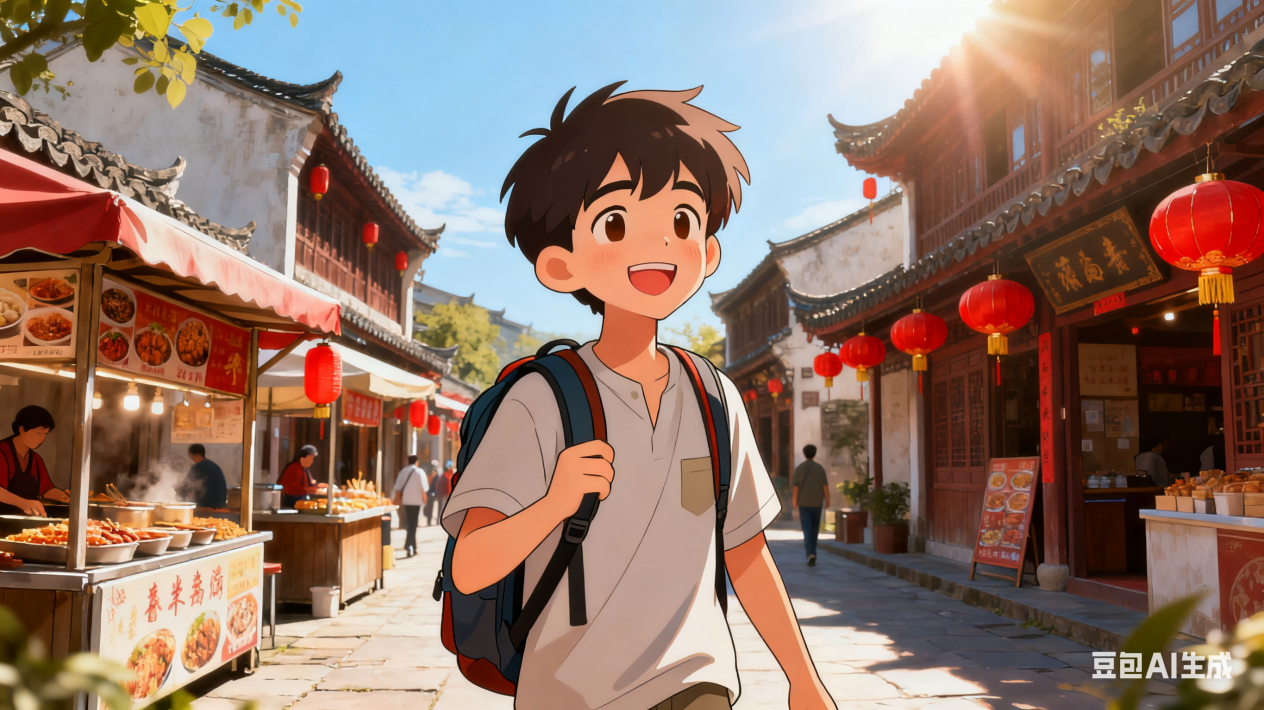
This year’s National Day holiday has seen a big travel rush across China. Many people have a long break, so travel bookings have gone up a lot. And young travelers born in the 1990s and 2000s are a large part of the visitors. However, their travel style has changed a lot. Many young Chinese travelers say no to “check-in travel”—the old way of “sleeping on the bus and taking photos at stops”. Instead of shallow (浅的) sightseeing, they prefer deep cultural experiences.
Examples are everywhere. At Shanxi’s ancient Guanque Tower, tourists chat and recite poems with actors dressed like Tang Dynasty people. In Anhui’s Wuhu, an old customs house uses AR for fun digital shows. College student Yan Ting once wandered (闲逛) Quanzhou’s old town: she watched locals make tea, chatted with them and enjoyed nanyin, a traditional music. “Local life is more attractive than hot spots,” she said. Wang Zixuan loved his time in Sanya—walking on the beach at sunrise and sitting to relax. Data shows searches for “intangible cultural heritage hands-on experiences”, “starry sky camping” and “city walks” rose 200% in 2025, with 70% of orders from post-90s and post-00s.
Some young people even try volunteer travel. In Guizhou’s Miao villages, they help record oral histories and traditional embroidery. “We want to give something to the place, not just take memories,” said one volunteer. More travelers now stay in small local hotels, eat at family restaurants and join charity work like trash cleaning. This new travel style helps them connect deeper with culture and local life.
原创编写 版权所有 侵权必究! 每日更新 个性化阅读 英语飙升!
1.1. What can we know about travel bookings during this year’s National Day holiday?
A They became much fewer.
B They stayed the same.
C They were hard to get.
D They increased greatly.
解析:选D。D细节理解题。第一段提到“Many people have a long break, so travel bookings have gone up a lot”(很多人有长假,所以旅游预订量大幅上升)。“gone up a lot”(大幅上升)与选项D中的“increased greatly”(大幅增加)意思一致。故选D。
2.2. What do young travelers prefer now instead of shallow sightseeing?
A Taking photos at stops.
B Sleeping on the bus.
C Deep cultural experiences.
D Visiting hot spots only.
解析:选C。C细节理解题。第一段明确指出“Instead of shallow sightseeing, they prefer deep cultural experiences”(比起浅层观光,他们更偏爱深度文化体验),这直接说明了年轻人的偏好。选项A(在景点拍照)和选项B(在公交车上睡觉)是他们拒绝的老式“打卡旅游”的内容;选项D(只去热门景点)并非他们现在的偏好,文中闫婷就认为当地生活比热门景点更有吸引力。故选C。
3.3. What does Yan Ting probably think of hot spots?
A They are more fun than local life.
B They are less attractive than local life.
C They are as good as local life.
D They are easier to reach than local life.
解析:选B。B细节理解题。第二段引用闫婷的话“Local life is more attractive than hot spots”(当地生活比热门景点更有吸引力),由此可推理出“热门景点不如当地生活有吸引力”,这与选项B的表述一致。选项A(比当地生活更有趣)与她的观点相反;选项C(和当地生活一样好)、选项D(比当地生活更容易到达)在她的表述中均未提及。故选B。
4.4. Who mainly ordered “starry sky camping” in 2025?
A Post-70s and post-80s.
B Post-90s and post-00s.
C Elderly people.
D Young children.
解析:选B。B细节理解题。第二段末尾提到“Data shows searches for... ‘starry sky camping’... rose 200% in 2025, with 70% of orders from post-90s and post-00s”(数据显示,2025年“星空露营”等搜索量增长200%,70%的订单 90后和00后)。70%属于很大比例,说明90后和00后是主要人群,与选项B相符。选项A(70 后和 80 后)、选项C(老年人)、选项D(小孩)均未被提及是该订单的主要人群。故选B。
5.5. Why do some young people do volunteer travel in Guizhou’s Miao villages?
A To take more beautiful photos.
B To get more money from the villages.
C To give something to the villages.
D To learn how to make local food.
解析:选C。C细节理解题。第三段中一位志愿者提到“We want to give something to the place, not just take memories”(我们想为这个地方付出些什么,而不只是带走回忆),贵州苗族村寨是志愿旅行的例子,由此可推理出他们参与志愿旅行的目的是“为村寨付出一些东西”,与选项C一致。选项A(拍摄更多漂亮照片)、选项B(从村寨赚取更多钱)、选项D(学习制作当地美食)均不是文中提到的志愿旅行的目的。故选C。